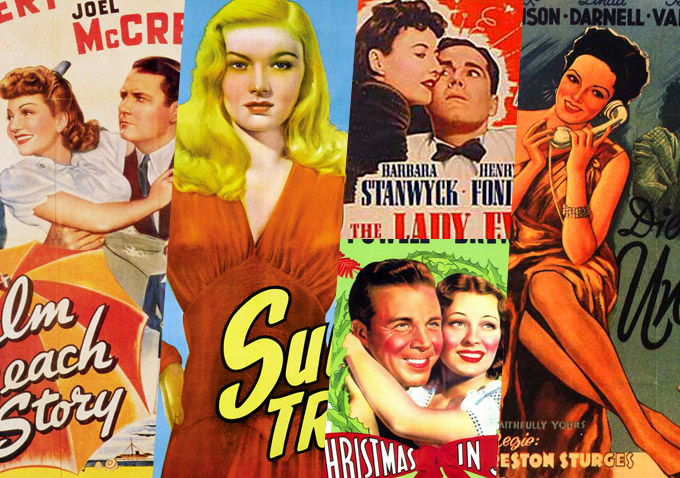 “The Miracle of Morgan’s Creek” (1944)
“The Miracle of Morgan’s Creek” (1944)
Proof positive that if you shoot your picture in a spirit of infectious
good cheer and put in enough screwballish sequences of an exasperated
but loving father (Sturges regular William Demarest) aiming a comedy kick at one of his daughters’ back sides, missing and almost back-somersaulting from the recoil, you can slip anything past
the censors. “The Miracle of Morgan’s Creek” tackles such Hays
Code-unfriendly issues as teen pregnancy, motherhood out of wedlock and
what we’d now call “roofie date rape” (but in 1944 is explained as
waking up pregnant after drinking a lot of “lemonade”). The unadorned logline, in which Trudy Kockenlocker (Betty Hutton), a flighty but
goodhearted girl goes out to a farewell dance for departing soldiers,
gets married to one of them whose name she cannot remember while drunk and discovers later that she is pregnant, would seem outrageously risque. But Sturges and a completely game cast treats the proceedings with such disingenuous brio that we can only imagine that the censors must have felt as if their pockets were being picked —like its heroine, the film is so bouncy and sweet-natured that it acts
like a distraction to whatever agenda lies beneath. And what
a distraction —you have to pay attention or ten other things will
have happened in the meantime, as the long-suffering dim-bulb stutterer
Norval (Eddie Bracken), whose devotion to Trudy will survive even as she carries another man’s baby, gets into ever hotter water in his
attempts to help her out. Featuring a “Sturgesverse” callback to “The Great McGinty” by having two of its actors appear
as the same characters in cameo roles here, the film also throws out
more narrative dead ends and red herrings than you could shake a stick
at. Take Norval’s eventual escape from prison —one of Sturges’ all-time funniest sequences— which seems set up so that we can follow him on
his epic quest to find the father of Trudy’s baby, but then that happens
offscreen, across a single cut and is unsuccessful anyway. And the
‘Miracle’ of the title? The thing that redeems everyone and makes
everything ok for Trudy and Norval? She has sextuplets, which makes
everyone, even the governor, very happy, and news of which causes
Mussolini to resign and Hitler to “demand a recount.” Thus ends
simply one of the most demented studio comedies of the 1940s.

“Hail the Conquering Hero” (1944)
The seventh film in a remarkable streak (not including Sturges’ war documentary short “Safeguarding Military Information” which was his first film with Eddie Bracken, star of ‘Hero’ and ‘Miracle’), “Hail the Conquering Hero” is less well known than Sturges’ other 1940s hits for some reason. Which means the Sturges-curious who haven’t made it this far yet have an enormous treat in store: if it’s not his absolute best film, it’s in the top three. Unfolding as a kinder, more humanist, more affectionate take on “The Great McGinty” (Sturges’ more acid style is often contrasted with that of Frank Capra, but this might be his most Capra-esque film), the film follows a sad sack everyman Woodrow (Bracken), who is medically discharged from the Marines due to chronic hayfever but is too ashamed to go home to his mother. Meeting a group of real Marines, headed by Sergeant Heppelfinger (William Demarest in perhaps the best of his many great roles for Sturges) and including Freddie Steele in a touching role as the tough-but-a-little-damaged Bugsy, Woodrow unwillingly goes along with their scheme and pretends to be one of them, so as he can get home, only for the entire town to have heard news of his “heroism” and be waiting on the platform. From there, the white lie spreads, as Woodrow gets swept up into a mayorial race and finds the girl he loved and lost may not be so lost to him after all. It sounds pretty standard war-era cornball comedy, and yet there’s a real control and wisdom here from Sturges, and he turns in a surprisingly insightful meditation on civic pride, honesty in politics and warh-hero worship in small-town America. It’s also very, very funny, giving his repertory of familiar character actors some of their best, most individual roles, and building to an ending that for once does not rely on a massive deus-ex-machina or a hugely contrived coincidence for a dismount. Instead, in one of Sturges most lastingly, chimingly satisfying films, we get a series of rousing speeches that suggest an idealism he only rarely displayed, as Woodrow reveals himself, in this cockeyed paean to honesty and patriotism and loving one’s mother, as a guy who didn’t fight but who maybe embodies everything worth fighting for.






Tom has a twin too in Palm Beach Story, not just Gerry. It hilariously makes everything neatly tie up at the end with a triple wedding. That\’s my favorite Sturges movie. So good!
Yeah, definitely one of my favorite directors from the golden age of Hollywood, with The Lady Eve, The Great McGinty, and Sullivan\’s Travels my top three.
It\’s bred in the bean.
I adore Preston Sturges. But I don\’t want to be a hero!
\’The Sins of Harold Diddlebock\’ or \’Mad Wednesday\’ is so woefully underappreciated, I had to pipe in to sing its praise. Seek this film out and see some classic Sturges bits on love and drinking!